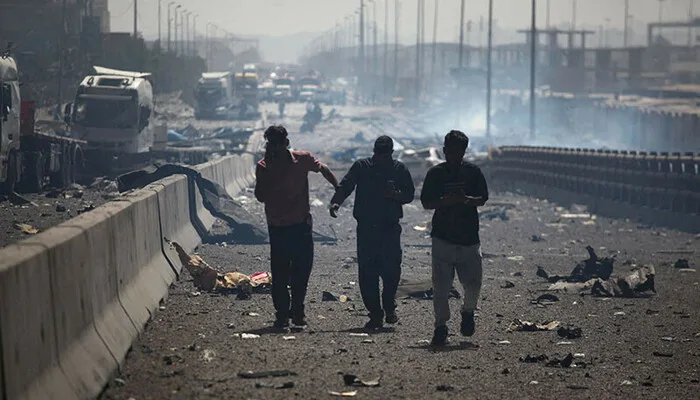
What is Armageddon?
Armageddon is commonly understood as the prophesied final battle between the forces of good and evil. The term originates from the Bible, specifically from the Book of Revelation (16:16), which describes it as the site of a great war before the end of the world. The word “Armageddon” is believed to be derived from the Hebrew “Har Megiddo,” referring to a historical battlefield in ancient Israel.
Religious Perspectives on Armageddon
-
Christianity (Biblical Prophecy)
- The Book of Revelation describes a climactic battle where the Antichrist and his armies will fight against divine forces led by Jesus Christ.
- Revelation 16:16 states: “Then they gathered the kings together to the place that in Hebrew is called Armageddon.”
- Various interpretations link this event to eschatological (end-time) prophecies involving global wars, natural disasters, and divine intervention.
-
Islamic Eschatology
- In Islamic teachings, the concept of Al-Malhama Al-Kubra (The Great Battle) is often compared to Armageddon.
- Islamic prophecies, found in Hadith (sayings of Prophet Muhammad, PBUH), describe a final battle between Muslims and non-believers before the Day of Judgment.
- A significant figure, Imam Mahdi, is believed to lead Muslims, alongside Prophet Isa (Jesus), in a war against the forces of Dajjal (the Antichrist).
- Sahih Muslim Hadith: “The Last Hour would not come until the Romans land in al-A’maq or in Dabiq (regions near Syria). Then an army from Medina will come to fight them.”
-
Judaism
- Jewish texts, such as the Book of Zechariah, describe a great war before the coming of the Messiah.
- Ezekiel 38-39 refers to the war of Gog and Magog, a battle where Israel will face a massive invasion before divine intervention.
-
Other Beliefs
- Hinduism describes the concept of Kali Yuga, an age of chaos before the god Vishnu (Kalki Avatar) comes to restore order.
- Norse mythology speaks of Ragnarök, a final war where gods and giants will battle, leading to the rebirth of the world.
Scientific and Research-Based Interpretations
While religious prophecies focus on divine events, scientific perspectives on “end-of-the-world” scenarios align with catastrophic theories:
-
Nuclear War Theory
- Scholars and defense analysts fear that escalating global conflicts and nuclear proliferation could lead to an Armageddon-like scenario.
- The Bulletin of the Atomic Scientists has maintained the Doomsday Clock, which warns humanity of the risk of global catastrophe.
- Studies suggest that a large-scale nuclear conflict between major powers (e.g., USA, Russia, China) could cause mass destruction, climate change, and potential extinction.
-
Environmental Collapse
- Scientists warn that climate change, resource depletion, and environmental destruction could lead to global societal breakdown.
- The Intergovernmental Panel on Climate Change (IPCC) reports that extreme weather, rising sea levels, and food shortages could trigger large-scale conflicts.
-
Asteroid Impact
- The NASA Near-Earth Object Program tracks asteroids that could collide with Earth. A large impact, like the one that wiped out the dinosaurs, could cause catastrophic destruction.
- In 2013, a Chelyabinsk meteor exploded over Russia, highlighting the potential threat of space objects.
-
AI and Technological Risks
- Experts like Elon Musk and Stephen Hawking have warned that uncontrolled artificial intelligence (AI) could become a threat to humanity.
- The rise of autonomous weapons and cyberwarfare increases the risk of global conflicts that could escalate to a world-ending scenario.
When Will Armageddon Happen?
There is no confirmed date for Armageddon, and most prophecies do not provide a specific timeline. Some historical claims of end-time predictions include:
- 1000 AD: Early Christian groups believed the millennium would bring the end.
- 2012: The Mayan calendar predicted a great change, which many misinterpreted as the world’s end.
- 2060 (Isaac Newton’s Prediction): Sir Isaac Newton, using biblical calculations, speculated that 2060 might mark a significant biblical event.
Scientific studies suggest that existential risks (e.g., nuclear war, climate change, or AI threats) are increasing, but none can accurately predict a specific “Armageddon” date.
Conclusion
Armageddon remains a concept shaped by religious beliefs and scientific predictions of catastrophic global events. Whether viewed through the lens of faith or scientific risk assessment, humanity faces multiple existential threats that could lead to widespread devastation. However, efforts in diplomacy, technological advancements, and global cooperation could potentially mitigate these risks, delaying or even preventing such an apocalyptic scenario.
Follow us on Google News, Instagram, YouTube, Facebook,Whats App, and TikTok for latest updates
















